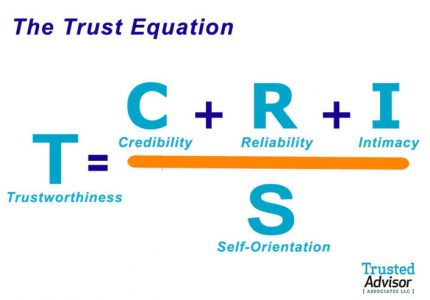Death of Trust – Leadership in Low Trust Times

I wrote an article that went viral. It concerned the conduct of a politician at the world cup. The behaviour I saw on the world stage seemed manifestly different to all the other world leaders she stood alongside and I wanted to write about that. What I hadn’t anticipated was the by-product of my choice to write about a politician. Many of the messages I received called into question the motivations of this politician. There was, from many, a mistrust of her intentions that I recognised all too well. It was familiar because the mistrust mirrored something I hear all the time in my work as a speaker from employees towards their companies.
When it comes to trust, we are living through a time of crisis and the implications are potentially catastrophic.
The Context
It has long been recognised that we are mistrustful of politicians but recently we have seen views becoming more polarised and people are now becoming mistrustful of not just the politician but also those people that support the politician. Pause and think about that for a moment, based on a piece of information such as the political view a person holds we are prepared to make decisions about their character and therefore trust. The consequences are frightening, if you take the recent Brexit vote in the UK the split in voters was 48.1% vs 51.9%. Since the vote the sides have remained relatively stable with people deeply entrenched in their beliefs. If one half of all voters now make negative personality and trust based assumptions about the other half, we have suddenly created a deeply fractured and damaged society.
These fractures in our society now encompass a general mistrust of news, statistics as well as the motivations behind decisions. We cannot tell what is truth and therefore what is trustworthy, and what is false or misleading.
This attitude of mistrust is now spreading into organisational life with equally disturbing consequences. High profile organisations have been public exposed as using deceitful practices. As a result, employees can now more easily adopt a similar cynicism towards their employer. Facebook, Volkswagen and Tesco are amongst the highest profile casualties but there have been a truly shocking number of similar stories. These are companies whose public face/brand is one of a trustworthy professional organisation. They have corporate value statements for employees that speak of a belief in honesty, integrity, trust, teams etc etc. Despite this being potentially at the highest levels there is a complicity to be dishonest, misleading and, at times, criminal…
How can we, as employees ever follow or trust our executive teams when lies and criminal behaviour are not just possible but seemingly commonplace in large organisations?
What Statistics Tell Us
What are employees to make of these news stories, why should they believe their current employer (who makes similar positive claims of trustworthiness) is any different? Well, it seems we have already made that decision, and the verdict for organisations is damning. A study by Ernst and Young found less than half of global professionals trust their employer, boss or team/colleagues. Less than half of global respondents have a “great deal of trust” in their current employers (46%), boss or team/colleagues (both 49%). Generation X appears to be the cohort placing the least amount of trust in employers, with a massive 59% holding “very little” or “no trust at all” in their employer. Line managers appear to be tarnished by these scandals also, often assumed to be the ‘mouthpiece’ of the dishonest organisations. A Harvard Business Review survey reveals 58% of people say they trust strangers more than their own boss.
And according one study, how much trust and safety employees experience correlates to how respected they feel by their leaders. Employees who felt that their leaders treated them with respect were:
- 63% more satisfied with their jobs
- 55% more engaged
- 58% more focused
- 110% more likely to stay with their organisation
I’m not the only one thinking this. One of my clients created a highly respected barometer called “The Edelman Trust Barometer”. In 2018 they published that “The 2018 Edelman Trust Barometer reveals a world of seemingly stagnant distrust.”
The CEO is quoted as saying:
“2017 was the year of global Trust implosion. In 2018, there is no sign of recovery” Richard Edelman
Quantifying Trust
In his book “The Trusted Advisor” David Maister proposes an equation that looks at the elements of trust. It is a simple and powerful model which very quickly articulates the reason we are in this crisis:

In an environment of distrust, the CREDIBILITY of sources is repeatedly called into question. Globally, nearly 7 in 10 people in the general population worry about fake news or false information being used as a weapon, and 59% say that it is getting harder to tell if a piece of news was produced by a respected media organisation (https://www.edelman.com/trust/trust-barometer).
When organisations and politicians are routinely exposed to have lied or misled people in their announcements we, of course, doubt their RELIABILITY. How can someone be reliable when they lie or if they break promises or act inconsistently. How many leaders, politicians or companies would you describe as dependable?
One of the first casualties of our time pressured environments has been face to face (1:1) time with colleagues, line-managers or leaders. Simply put most employees hardly ever see senior leaders, almost certainly rarely speak directly with them and they often desire to spend significantly more time with their line manager. What suffers here is, INTIMACY, this is the personal connection we have that reassures us this person can be trusted.
Finally, SELF-ORIENTATION, which essentially means what is the motivation of the other person. Are their intentions to help others or help themselves. You’ll notice it is the single denominator in this equation so increasing ‘self-interest’ reduces trustworthiness immediately. Even as I write this sentence the link to politicians and organisations seems all to direct. Even leading companies like Google with their deep rooted commitment to people and bettering the world, have struggled to prove that their motivations are to be trusted (https://www.theguardian.com/technology/2018/feb/15/google-chrome-adblocking-online-ads).
Let’s take an example: Without wanting to charge this dialogue politically, the trust equation neatly explains why Obama would be largely seen by people as more trustworthy than Trump (I can only judge through the lens of the media so a supporter of Donald Trump might disagree but purely through the media I receive this is what I see).
Trump’s credibility is a little shaky due to the highly publicised fact-checking against his speeches. His is very contrary, often contradicting himself and seemingly changing his opinions in a fluid way, this makes him unreliable to my mind. For me at least when he speaks I often feel he is saying what the audience want to hear, I therefore never feel I am seeing the authentic person, this damages any change of a feeling of intimacy, for my reasoning behind this belief see this article. Finally comes the question of whose interests do we believe he is serving primarily – since I know where I stand on his self-orientation I can also not see why personally I don’t feel anything near the levels of trust for Trump that I did for Obama even though I obviously know very little about each person.
My recommendations
As leaders we can use the trust equation to reflect on our impact. How effectively have you established your credibility with your team? Take time to consider your personal impact when you speak and make a conscious effort to use facts more than opinion. Ironically many leaders try to build credibility by talking more when actually credibility can be quickly enhanced by listening significantly more than you speak!
How reliable are you? My guess is that you often set high standards for your people such as quality of work, meeting deadlines, personal conduct and so on. It is important you demonstrate reliability by consistently meeting those standards. Being true to your words and consistency are key here! Sadly managers often fail in this area not because they lie but rather they are hopelessly optimistic about themselves and how they are perceived by others.
Are you willing to being vulnerable and authentic in-front of others? I will forever be grateful to the work of Brené Brown and her TED talk on ‘the power of vulnerability’. She gave me the platform to challenge thousands of leaders on the value of intimacy with their teams. Strong leaders build deep relationships, contrary to belief that leaders have to be strong all the time actually the best leaders are simply human and in revealing their humanity they give permission to others to reveal theirs.
Are you open to the concept of servant leadership? Recognise that, in leadership, the greatest measure of success is the performance of your team and the relationships that team has. Don’t let the ego dominate your thinking, your needs and the team’s are inextricably linked – serving the team is the best way to serve yourself.
We could all benefit from thinking carefully on this theme of trust. I fear it may even be too late to save some of our larger institutions and organisations where generalised suspicion and indifference from the public now prevail, but it is not too late for you…and your teams! You have size on your side, the smaller the team the more manageable this task becomes, I believe if you open up to your people and put their interests to do a good job as your priority we can build trust in a way that unleashing massive benefits both emotionally and in bottom line performance.
Author: Chris Atkinson
Chris is an international business speaker, author of Corporate Energy: How to Engage and Inspire Audiences, and UK Managing Director of Strategic Leadership.




